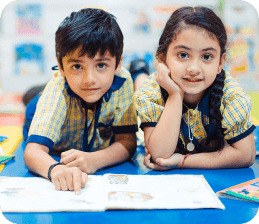At Junior Pathshala, play-based learning is at the heart of our teaching philosophy. We understand that children naturally learn best when engaged and having fun. Our approach is designed to spark curiosity and foster active participation. By incorporating toys, games, and interactive activities, we create an environment where learning happens effortlessly. Whether it’s problem-solving or developing motor skills, play-based learning helps children grow cognitively, socially, and emotionally while nurturing their creativity.
Unlike traditional methods, where children may passively receive information, them to experiment, collaborate with their peers, and use their imagination. Activities like role-playing, building blocks, and arts and crafts help children grasp complex concepts, promote teamwork, and encourage problem-solving. This form of learning ensures that education feels more like play, making it enjoyable for young learners.
Benefits of Play Based Learning at Junior Pathshala
The advantages of play-based learning are far-reaching and extend beyond academic skills. At Junior Pathshala, this approach helps children develop vital life skills that will benefit them. Social abilities like sharing, communication, and cooperation are naturally fostered through play. Children learn to regulate emotions, develop empathy, and resolve conflicts in a supportive and relaxed setting.
Play-based learning also sparks creativity and critical thinking. Through hands-on activities, children are encouraged to explore, ask questions, and seek answers, enhancing their problem-solving skills. At Junior Pathshala, we know that when children can explore through play, their curiosity grows, leading them to develop a lifelong love for learning.
Why Choose Junior Pathshala?
Selecting the right environment for your child’s education is crucial. Junior Pathshala provides the perfect setting for play-based learning. Our experienced educators understand the significance of play in a child’s development and use it to support academic and personal growth. Balancing structured activities and open-ended play ensures that every child’s educational journey is fun and fulfilling.
Read More: Play-Based Learning: The Future of Early Education

